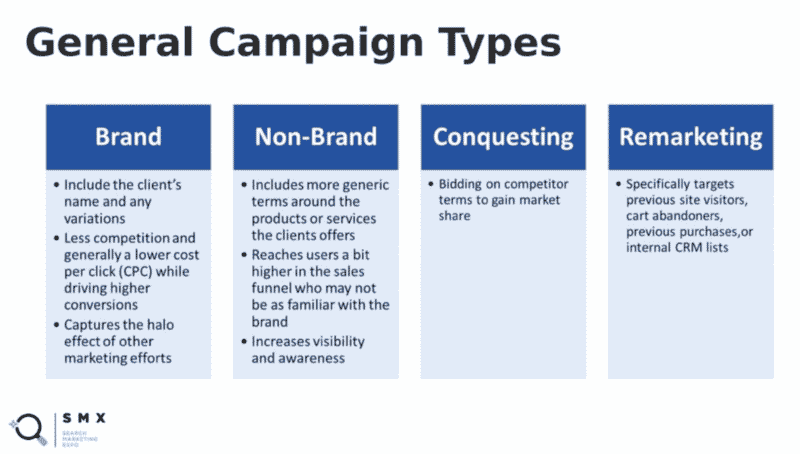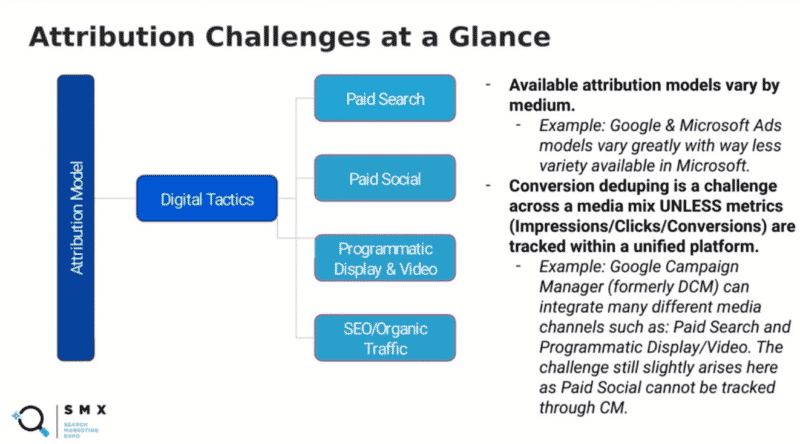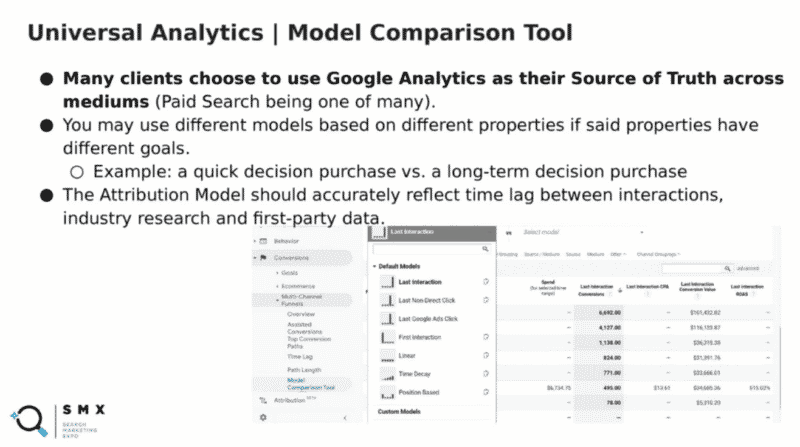There are numerous ways to measure paid search and its contributions across channels. Your PPC strategies can guide specific user behaviors, and in turn, change how you measure attribution and cross-channel lift within your marketing mix. In this session at SMX Advanced 2022, Alyssa Altman and Andy Orlando discuss the role of paid search in attribution. They’ll go over:
- Paid search and attribution
- The marketing funnel and paid search types
- Campaign types and their contribution
- The importance of data modeling
- Creating your attribution toolkit
- Analysis examples and model comparison tools
- Picking your model
- Insights and tips
Paid search and attribution
Paid search is a critical piece of the attribution modeling puzzle, with over 8.5 billion searches a day happening in Google. But not all searches are created equal. People tend to search using terms that indicate where they are in the buying funnel. Whether that’s intent to purchase or perform competitor research. Considering the attribution model, those searches are assigned a certain weight, which can become complicated.
The marketing funnel and paid search types
Orlando goes on to explain that the top of the funnel is where awareness happens. Non-branded searches are typically here. The point is to increase brand awareness and target visitors to your website. The next step is where interest and consideration come into play. The bottom of the funnel is where the commitment and conversion happen. Brand search and Performance Max campaigns target bottom of funnel buyers by finding targeting those searchers who are ready to buy.
Campaign types and their contribution
The four campaign types that target buyers ready to convert are:
- Brand
- Non-brand
- Conquesting
- Remarketing
Upper and middle funnel tactics such as social display and unbranded search tend to lay the groundwork in preparing users for a conversion. These tactics factor heavily early in the conversion journey but do not directly lead to a conversion. They tend to be undervalued as a contributing conversion factor. Orlando explains that although display, unbranded search, and remarketing contribute some, it’s essentially branded searches that attribute the most.
The display, unbranded search, and remarketing tactics can be seen as the “forgotten workers” that fill the conversion funnel and set the stage for the hero “branded search” to sweep in and close the deal. And since they’re lower in the funnel branded search, brand searches ended up generating more last click conversions and thus tend to be overvalued in traditional attribution models such as Last Click. So branded search looks like the hero comes in and saves the day and the upper funnel package tends to be kind of forgotten.

Attribution challenges
Altman explains that a lot of the challenges around attribution have to do with the fact that there are different models within the different platforms. Google has more options available for advertisers within the platform and Analytics, whereas Microsoft has a lot less. So even if you are attempting to use the same model across channels, issues can arise.
Another issue is multiple channels trying to take credit for the sale or lead. Altman points out that each channel may be correct in wanting to take credit, but when overreporting happens, it can be frustrating for the advertiser to sort out. Humans view different types of content across different channels and they make a decision somewhere along the funnel where an advertiser has placed an ad. It will essentially be up to the advertiser to place the credit.

Attribution model comparison tools
Google Analytics is arguably the most popular option for comparing attribution models. If you’re using Google Analytics, you’ll be able to compare the different models and look at all media coming in (if tagged properly). Altman suggests using UTM parameters to ensure conversions are being tagged properly. GA lets you compare the different models before you make a decision on which one you want to use.
The Top Conversions Path Report in the Multi-Channel Funnel section is an undervalued report, says Altman. This view provides insight into what interactions a user had until they converted. It can determine how valuable each interaction is for modeling.


Altman goes on to review the most popular attribution models and their advantages and disadvantages. These are available to advertisers in Google Analytics.
Data modeling and data-driven attribution
Orlando explains that having a data-driven attribution model can help marketers optimize, in real-time, across the conversion journey. Machine learning and AI are used to assign attribution across the conversion journey. Microsoft As calls this “As it Happens” attribution modeling, which is essentially Google’s “Last Click.”
Create an attribution toolkit
Altman suggests the following tips when creating your attribution toolkit:
- Collect data on your audience
- Begin creating and testing
- An arsenal of tools to help you perform a deeper analysis
- Utilize Google tools such as Analytics multi-funnel reports and path reports, and attribution model comparisons
- Land on the attribution model for your organization or business segment
- Use third-party tools
- Use zoomed-in attribution models within the platforms such as Data-Driven attribution in google ads to optimize in-platform
Attribution model recommendations for paid search
Altman suggests that if you’re running brand awareness campaigns through Google ads and other platforms, you may want to look at First-Click attribution. If your campaigns are a mix of brand awareness and mid and lower-funnel advertising, you might want to go with Linear attribution because it distributes the credit for the conversion equally across all of those paths. And if you’re running a lot of media and multiple channels, both digital and traditional, you might want to look at that last non-direct click.
Additional tips
For more details and additional tips and tricks from Altman and Orlando to ensure you’re using the correct attribution model for your ads, get your free pass here.
Already registered for SMX Advanced? Log in.
New on Search Engine Land
https://searchengineland.com/the-state-of-attribution-modeling-in-paid-search-386506


